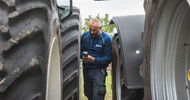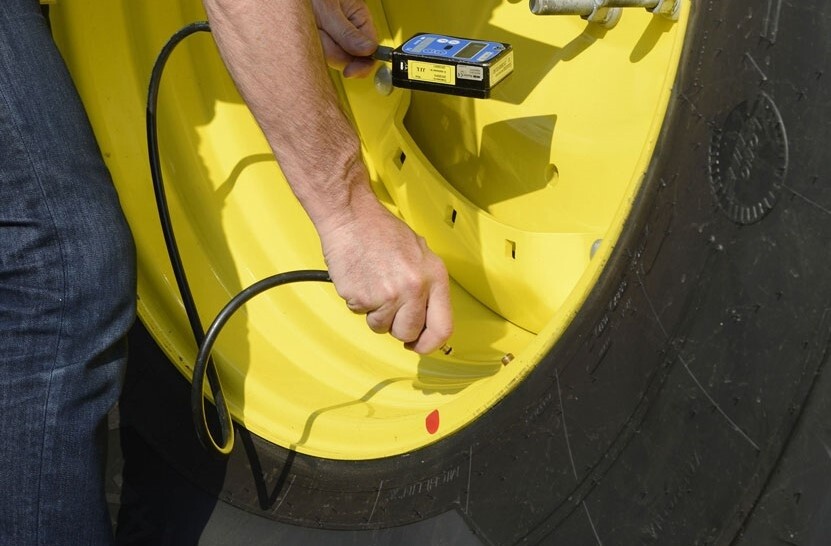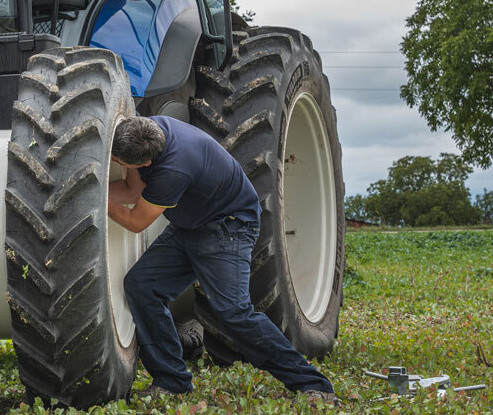
How to ensure good tractor tyre maintenance
T&T Tests Prepa (8).jpg
How to ensure good tractor tyre maintenance
SUMMARY:
Simple tyre maintenance for prevention
These simple preventive measures are simple and can help you avoid inconveniences such as machine downtimes that could bring your business to a standstill. Tyre maintenance ensures that your tyres last longer by preventing premature wear, which would otherwise require early replacement.
Tip No. 1 for tyre maintenance: check their pressure regularly
Tyre pressure is a recurring theme in our articles, for the simple reason that it is key to the proper functioning and longevity of tyres.
This is our first recommendation for tyre maintenance. Be sure to check pressures regularly with a calibrated pressure gauge or with your CTIS (Central Tyre Inflation System) if you are equipped with one.
Don't forget that optimum tyre pressure must be adapted to the load and speed of your farm machinery. Our article on tyre pressure or our online tool "MICHELIN Agropressure" will help you to determine them, if necessary.

Check tyre pressure regularly
When should pressure be checked?
Given that a natural loss of air is inevitable over time (whatever the tyre), we recommend that you check your pressures once a month or every time you change implements, since any difference in load implies an adjusted pressure.
If your tyres are weighted down with water, the volume of air is implicitly reduced, which implies less pressure: it is therefore important to monitor your pressures frequently in this case.
The risk, if you work with under-inflated tyres, is that you will overload them and cause them to age prematurely, leading to early replacement and a consequent impact on your costs.
Tip No. 2 for tyre maintenance: inspect them regularly
Vehicle maintenance is a good opportunity to check the condition of your tyres.
Before checking pressures, we recommend that you inspect the general condition of your tyres for any deformations (bulges, cuts, cracks, etc.).
This is an important check, because if you detect a serious anomaly before it gets any worse, a prompt repair could save you substantial costs.
If you notice any alarming damage to your tyres or if you have any doubts, please report it to your tyre professional for advice.

Inspect your tractor tyres regularly
T&T Tests Prepa (1).jpg
What can be done about irregular wear?
If you notice pronounced wear on just one side of the tyres, again, don't hesitate to show them to your agricultural tyre specialist. Irregular wear may be caused by a problem with the alignment of your vehicle, in which case adjustment will be necessary.
In some cases, swapping right/left tyres will help to even out their wear and thus impact their longevity.
To find out more, read our wear guide, and especially our article on irregular wear.
Tip No. 3 for tyre maintenance: clean them after working in the field
We're not talking here about removing mud, but about substances that can be aggressive to the tyre (chemicals, grass juice, plant protection products, etc.).
A simple water hose cleaning after the field is a good habit to adopt in order to preserve your tyres for as long as possible.
The right precautions for storage and wintering
If you store alternative mounts for any length of time, make sure that the tyres do not become deformed or stressed by crushing. Store them in a dry, well-ventilated place away from direct sunlight and away from:
-
any source of heat (flames, welding machine, etc.)
-
any source of ozone (electric motor, electric transformer, etc.)
-
any chemical substances (solvents, hydrocarbons) likely to alter the rubber
-
any sharp metal object
When wintering machinery (e.g. combine harvesters), a slight increase in pressure will be necessary to avoid tyre crushing due to the natural loss of air to which tyres are subject over time.
Conclusion
As we have explained, proper tyre maintenance requires a few simple, regular measures that can prevent problems and maximise the life of your tyres.
Of these, tyre pressure is the most important. It's also what guarantees the performance of your tyres when you're working in the fields. To make sure your tyre pressure is adapted, we recommend that you always adjust it according to your load. Our MICHELIN Agropressure tool can help you estimate it.
Identify the right pressure for your tyres with MICHELIN Agropressure
Have Questions? We're Here to Help You Grow!
Your request has been sent, we will get back to you as soon as possible
Need more advice? Discover our tyre maintenance and caring guide




